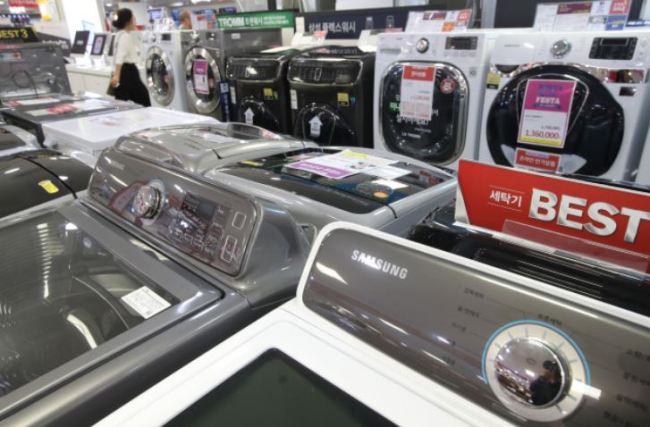Seoul confident in taking US washer safeguards issue to WTO
Korea may impose retaliatory tariffs on US goods
By Shin Ji-hyePublished : Jan. 23, 2018 - 15:39
The Korean government said Tuesday it will lodge a complaint with the World Trade Organization about US President Donald Trump’s decision to slap tariffs on imported washing machines and solar panels produced by Korean manufacturers, expressing confidence the excessive sanctions will prove invalid.
Immediately after Trump announced the move to slap steep tariffs on Korean goods overnight, the Korean government and related industrial officials held a meeting to discuss how to respond to the safeguard measures and industrial damages.
Immediately after Trump announced the move to slap steep tariffs on Korean goods overnight, the Korean government and related industrial officials held a meeting to discuss how to respond to the safeguard measures and industrial damages.

“We will file a petition with the World Trade Organization about the inappropriate safeguard measure. I believe we can win the case given past winning experiences against the US excessive import regulations,” said Trade Minister Kim Hyun-chong in the meeting. He cited US safeguards on Korean steel in 2002, anti-dumping duties on washing machines in 2013 and anti-dumping duties on steel pipe in 2014.
“While the (Seoul) government and the industry actively raised through diverse channels the problems and unjustified nature of the safeguards, the US ultimately made the decision based on domestic political situations rather than abiding by the international regulations,” said Kim, who was a senior lawyer at the WTO‘s Appellate Body Secretariat and Legal Affairs Division from 1999 to 2003.
The Trump Administration announced Monday it would impose a 50 percent tariff on imported large residential washers exceeding 1.2 million units in the first year. The tariff will be 45 percent and 40 percent in the second and third years, respectively.
As for imported solar panels, a 30 percent tariff will be imposed on the first 2.5 gigawatts’ worth of imported solar panels, with the tariff slated to decline over the next four years.
Citing that in order to implement safeguards under WTO agreements, one must face a radical surge in imports, grave damage to local industry and establish a correlation between the imports surge and industry damage, Kim contended that the US’ decision was wrongly made.
“Even after the US International Trade Commission had ruled that Korean washing machines are not the cause of industry damages, the (US) moving to include the products in the import restrictions violates the WTO agreement.”
Kim, describing the US decision as “incomprehensible” considering the contribution Korean firms are making to the US economy, said the government will also be seeking an immediate launch of bilateral meetings to discuss compensation for Korean companies.
“If the discussion with the US on compensation breaks down, we will suspend concessions (on imported goods from the US).” Suspending concession refers to stopping tariff reductions or bounded tariffs on certain imported products. His remarks appeared to be a warning of retaliatory tariffs that could be imposed on imported goods from the US.
Korea also believes that rising imports of solar panels in the US follows rising demand, and the difficulties of the US solar panel industry come from management failures and fierce competition with other energy source industries such as wind power and gas.
Korean companies expressed deep regret at the decision. Samsung Electronics said the US announcement is “a great loss for American consumers and workers. This tariff will lead consumers to buy innovative products at higher prices.”
Separately, the Korean government said the same day it asked the WTO to impose annual trade sanctions worth $711 million on the US. That comes as a follow-up measure after Korea won the washing machine dispute with the US in September of 2016.
In January of 2013, the US imposed anti-dumping tariffs on Korean washing machines on the grounds of targeted dumping. In August of the same year, Korea complained to the WTO, winning the case the following month.
The US, however, did not enforce the decision until the end of last year. Under the WTO agreement, the winning nation has authority to ask for the suspension of concessions against the losing nation if the latter does not adequately meet the decision.
By Shin Ji-hye (shinjh@heraldcorp.com)



![[AtoZ into Korean mind] Humor in Korea: Navigating the line between what's funny and not](http://res.heraldm.com/phpwas/restmb_idxmake.php?idx=644&simg=/content/image/2024/04/22/20240422050642_0.jpg&u=)
![[Exclusive] Korean military set to ban iPhones over 'security' concerns](http://res.heraldm.com/phpwas/restmb_idxmake.php?idx=644&simg=/content/image/2024/04/23/20240423050599_0.jpg&u=20240423183955)



![[Graphic News] 77% of young Koreans still financially dependent](http://res.heraldm.com/phpwas/restmb_idxmake.php?idx=644&simg=/content/image/2024/04/22/20240422050762_0.gif&u=)

![[Herald Interview] Why Toss invited hackers to penetrate its system](http://res.heraldm.com/phpwas/restmb_idxmake.php?idx=644&simg=/content/image/2024/04/22/20240422050569_0.jpg&u=20240422150649)





![[Exclusive] Korean military to ban iPhones over security issues](http://res.heraldm.com/phpwas/restmb_idxmake.php?idx=652&simg=/content/image/2024/04/23/20240423050599_0.jpg&u=20240423183955)



![[Today’s K-pop] Ateez confirms US tour details](http://res.heraldm.com/phpwas/restmb_idxmake.php?idx=642&simg=/content/image/2024/04/23/20240423050700_0.jpg&u=)